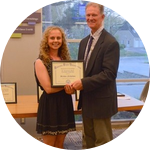About This Project
High amounts of sedentary behavior have negatively impacted the health and well-being of children in the United States. Sit-to-Stand desks are desks that allow students to move and engage more in the classroom setting. We plan to implement a Sit-to-Stand desk trial in an elementary school classroom to evaluate the impact these desks have on physical activity and sedentary behavior, and academic performance as compared to a classroom that uses traditional sitting desks.
Ask the Scientists
Join The DiscussionWhat is the context of this research?
Research has identified negative health impacts of prolonged sitting, including increased risk for diabetes, cardiovascular disease, and obesity. It appears children do not compensate for sedentary behavior; they don’t reduce food intake or increase physical activity levels following prolonged periods of sitting. Traditional school desks are associated with high amounts of prolonged sitting within the school day. Sit-to-Stand desks are becoming popular in offices and schools to promote healthier lifestyles. However, there has been little research on the effects of the sit-to-stand desks in the classroom environment for elementary-aged students. Studies suggest Sit-to-Stand desks have the potential to increase energy expenditure, decrease sedentary time, and improve academic performance.
What is the significance of this project?
Children have a high prevalence of overweight and obesity (~32%) that has increased over the past 30 years. Television time, low physical activity levels, and high levels of sedentary behaviors have negatively impacted children’s health. The Physical Activity Guidelines for Americans suggest children get 60+ minutes per day of physical activity. The elementary school classroom is an environment where sedentary behavior is highly prevalent. High amounts of uninterrupted sedentary time, in combination with cuts to physical activity opportunities and physical education have led to negative health and possibly negative educational outcomes. Since children spend the majority of their day in the classroom, it is important to provide them with an environment that facilitates healthy behaviors.
What are the goals of the project?
This project will address the question “Will a Sit-Stand desk trial in the elementary school environment positively affect student’s physical activity and sedentary behavior, and academic performance?” The trial will be conducted in two elementary school classrooms in Manhattan, Kansas (one with the traditional desk and one with the Sit-to-Stand desks). Physical activity and sedentary behavior will be measured with the use of accelerometers, and academic performance will be measured with distribution of surveys to parents, teachers, and students pre- and post-intervention evaluating on-task behavioral changes. The overarching goal of this project is to create positive classroom environments for elementary aged students that promote health and well-being.
Budget
To evaluate the effects of Sit-to-Stand desks in an elementary school classroom, we would like to purchase adjustable desks and stools that provide students the choice of sitting or standing throughout the school day. These type of desks have a cubby for students to store their belongings and a noise-free fidget bar so children may move without causing distractions. Our goal is to provide one classroom with these desks within the school environment, a place where budgets are increasingly being cut. Through Experiment.com, our goal is to obtain partial funding for the overall project. The AlphaBetter Stand-Up Desks with Book Boxes will cost $286.84 per desk, and the adjustable Stools will cost $136.95 per stool. The purchase of 16 desks and 16 stools would cost a total of $6,781. The remaining desks and stools will be paid for through other funding sources for the project, including an undergraduate research grant obtained by the undergraduate researcher leading this project.
Endorsed by
Meet the Team
Affiliates
Bradyn Nicholson
This coming fall, I will be a senior majoring in Kinesiology at Kansas State University. My short term goals include obtaining a Master’s of Public Health degree from an accredited institution. My long term goals include becoming a Public Health Practitioner to implement services and programs to improve public health with the possibility of earning a doctorate in Public Health. This project is special to me because I believe changing healthy behaviors early on in life will be the most beneficial in creating long term behavioral changes. Obese children are more likely to become obese adults, therefore, promoting healthy behaviors early on will decrease the likelihood of this occurring. In addition, those who are healthier are happier and may benefit the community more than those who are unhealthy. This project will allow me to utilize the skills and knowledge I have gained to go out into the real world and create lasting changes. Growing up, I was involved in cheer, gymnastics, powerlifting, and weightlifting. During high school, I became interested in running and eating healthy so I knew I wanted to choose a career that involved promoting a healthy lifestyle. While attending K-State, I became interested in Public Health. Outside of research, I am interested in continuously expanding my knowledge, surrounding myself with people and opportunities that bring me happiness, volunteering in the Manhattan community and surrounding areas, and serving as a positive role model and leader. I enjoy being outdoors, reading, being physically active, taking care of my plants and herbs, doing yoga, running, lifting weights, baking/cooking, and eating healthy.
Sara Rosenkranz
I completed my MS in Kinesiology and my PhD in Human Nutrition in May of 2010, followed by a Research Fellow position at the University of Western Sydney Medical School in Australia. In September of 2015, I began my first tenure-track position.
My research is focused around the interaction of diet and physical activity and how they work together to play a role in determining health outcomes. I currently have two ongoing research projects which are related to inactivity physiology and the interaction of diet and sedentary behavior/physical activity. I also have a current project examining the differential effects of exercise in the post-prandial period for people meeting physical activity guidelines, compared with those who get little to no leisure time physical activity. I am particularly interested in differences in glucose, insulin, inflammation, oxidative stress, and airway health as a product of lifestyle health behaviors, for both acute and chronic time frames.
I also have a life outside of work. I have two kids, ages 9 and 14, who keep me very busy with their various activities. I also have a husband who is one of my key research collaborators. In my spare time I love to read, play piano, bake, hike, bike, kickbox, and strength train.
Additional Information
Project Backers
- 6Backers
- 8%Funded
- $529Total Donations
- $88.17Average Donation




